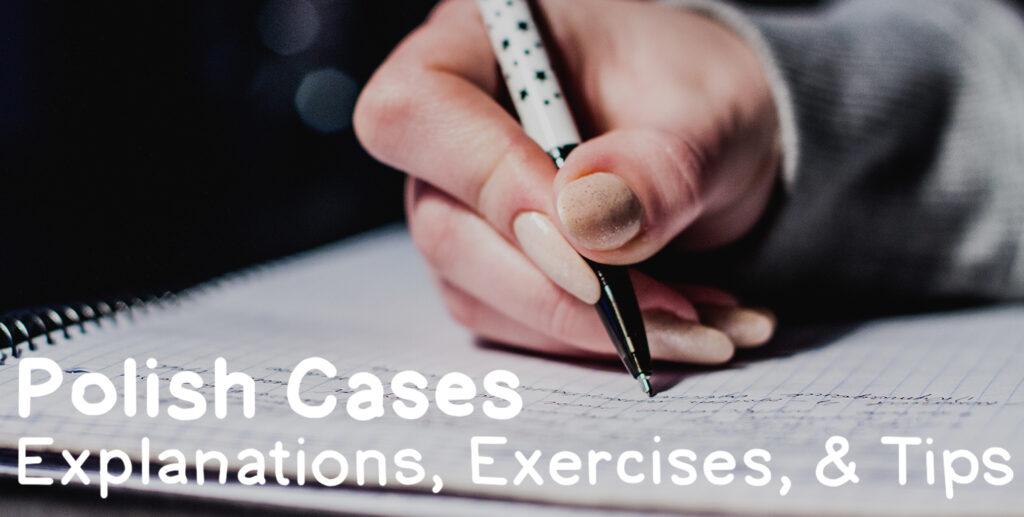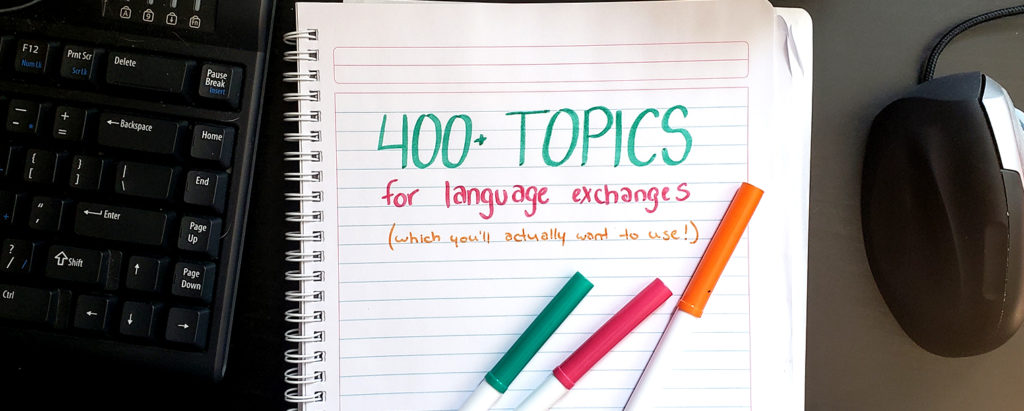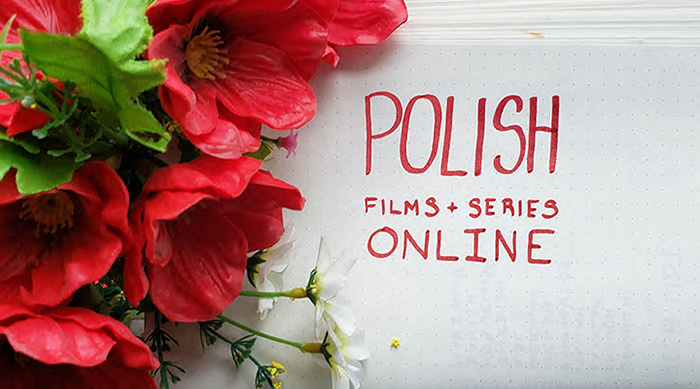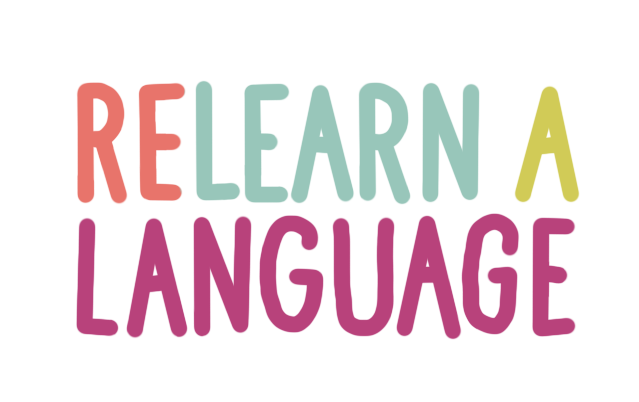Polish Cases FINALLY Explained (with 500+ Free Practice Exercises)
by Marissa Blaszko · October 27, 2021

Polish cases are one of the most frustrating parts of the language to learn.
After learning a handful of other languages, I was shocked to see how few learning resources there were online for Polish cases considering they’re probably the most difficult part of the language!
The goal of this Polish cases tutorial is to be a resource you can revisit over and over again.
To use it effectively, save it on your browser or on Pinterest. As you continue with your Polish classes or other textbooks, revisit it by yourself or with tutors and use the exercises over a course of months.
And most importantly: don’t stress. Remember–other language learners before you have learned Polish cases! Give yourself time and patience as you tackle learning the Polish language.
How To Use This Polish Cases Tutorial
As I said in the introduction, this page was made to be a resource that you can visit over and over again. Here, I’ll explain some tips and tricks for using it effectively long-term.
Take Your Time In Language
Before we get into anything else, this tutorial (like all textbooks) builds on itself. So go case-by-case and section-by-section.
That means: get comfortable with nominative first, then move onto instrumental. Do the instrumental case piece-by-piece, then move onto the accusative case.
Don’t try to cram all of the grammar into your head at once then go ballistic practicing. Trust me. This will take time, so save this page for reference.
Studying Polish Cases by Yourself
Now, here is how to use all of the sections for every individual Polish case.
The first thing you’re going to see in every section in this tutorial is a video and a reference chart.
(All of the videos have English subtitles, so you’ll likely want to turn those on.)
Before you really dive into practicing Polish cases, you’ll want to have a good “feeling” for them first. This doesn’t mean memorizing each case exactly, but still getting a general idea.
Here are a few ways to do that:
- Make a creative mind map.
- Use a flashcard app. I personally make myself a million practice sentences in the flashcard app Anki (but know some people prefer Memrise or Quizlet). I do this by going through workbooks, practice videos, and anything else and putting the most useful sentences into the flashcards, Polish on one side and English on another. Then I regularly practice translating English sentences into Polish, being mindful of the grammar “trigger” of each case is. (This is a really similar exercise to the written translation exercises on this page.)
- Watch the additional videos. Each section has videos full of listening practice, quizzes, or additional explanations. Listen to them and try the quizzes or mirroring the examples given. Ask yourself: why was it that case and not another? Was that the masculine, feminine, or neuter? Was that singular or plural? Be attentive and actively work to understand the logic.
Identifying Real-Life Uses of Polish Cases
- There are plenty of beginner podcasts and YouTube channels for learning Polish. For intermediate students who are still struggling with using cases, my suggestion is to grab a printed transcript, pen, and paper, and identify all of the different cases in the podcast or video as well as the reason each one is used. Then, listen to the episode through and use mirroring to practice by yourself.
Practicing Polish Cases in Speaking & Writing
Finally, the best thing you can do for yourself in any language is to get real-life practice.
You’ll find three ways to use the Polish case exercises on this page.
- Translations. These are meant to get you practicing thinking quickly about the specific endings of each case, and not-so-much the uses (since the context of these exercises is obvious on this page.)
- Discussion topics. These are questions you can use to practice with a tutor to get yourself thinking critically about how to use cases in an organic way. You can use them on each individual case to drill, and later you can go down to the bottom bonus section and start mixing them together.
- Writing prompts. Want to practice before you start speaking with your tutor? Use the discussion topics as writing prompts!
1. Nominative Case
“Nominative” is the default state of any noun. Here we’ll simply go over the theory of the Polish nominative case so you understand where you’re starting before “transforming” other words into the proper case.
The most important thing is that when memorizing words, you will want to memorize them in nominative singular as a “default starting point”.

2. Instrumental Case

Additional Instrumental Case Listening & Help
Instrumental Case Translation Practice
Instrumental Case Speaking Practice
Send this page to your tutor and practice together by practicing questions!
TIP: if you can’t answer a question (“I don’t have a brother” or “I don’t like tea”) don’t worry! Make something up.
- Introduce yourself with your gender, nationality, one trait, and job.
- Introduce your immediate family members and their genders, one trait, nationalities, and jobs.
- Introduce your tutor, including their gender, one physical trait, nationality, and job.
- Introduce your 2 best friends including their gender, one trait, nationalities, and jobs.
- Who is Brad Pitt? (Gender, one trait, nationality, and job.)
- Who is Cristiano Ronaldo? (Gender, one trait, nationality, job.)
- Who is Frida Kahlo? (Gender, one trait, nationality, job.)
- Who is Angela Markel? (Gender, one trait, nationality, job.)
- How do you go to work? (What mode of transportation?)
- How do you never go to work?
- What is your favorite way to travel?
- What is your least favorite way to travel?
- Do you normally use a pen or pencil when writing a quick note?
- Do you ever use crayons or markers to write?
- What celebrity are you interested in?
- What sport are you interested in?
- What hobby are you interested in?
- What language are you interested in?
- What country are you interested in?
- What are you most stressed about in daily life?
- What do you never stress about in daily life?
- How do you like your coffee or tea? (Cream, sugar, lemon, ice, etc.)
- Describe a cup of coffee or tea that is your least favorite way to prepare it.
- What ingredients do you like soup with? (I like soup with….)
- What ingredients do you like salads with? (I like soup with….)
- What ingredients do you like sandwiches with? (I like soup with….)
- What sides do you like to eat meat/tofu/protein with?
- Who do you like to go to restaurants with?
- Who do you like to travel with?
- Who do you like to spend the holidays with?
3. Accusative Case

Additional Accusative Case Listening & Help
Accusative Case Translation Practice
Accusative Case Translation Practice
Send this list to your tutor and practice using the cases in real life!
Tip: Again, if you don’t have a real answer (“I’m not drinking anything right now”) don’t worry. Make something up!
- Name 3 things you see right now.
- Name 3 things you see outside the nearest window.
- What are you drinking right now?
- What are you eating right now?
- Who is a family member you like?
- Name one drink you like and one drink you love.
- Name one food you like and one drink you love.
- Name one hobby you like and one hobby you love.
- Name one language you like and one language you love.
- Name one sport you like and one drink you love.
- Name a music genre you like and a music genre you love.
- Name a time of year you like and a time of year you love.
- What are 3 things you want to buy this week?
- What is one sport you play?
- What food do you like to cook?
- What are 3 types of animals you like?
- Pick up 5 objects near you and complete the sentence: “I have _____.”
- Name 3 things you see in this image of a desk. (“I see…”)
- Name 3 things you see in this image of food.
- Name 3 things you see in this image of drinks.
- Name 3 things you see in this image of transportation.
- Name 3 family members you see in this image of a family tree.
- Name 3 professionals you see in this image of working people.
- What do you think this woman is writing?
- What do you think this man is writing?
- What do you think this child is writing?
- What do you think this group is looking at?
- What do you think this man is listening to? (activity/genre)
- What do you think this group is listening to? (activity/genre)
- What do you think this group is watching? (activity/genre)
- What do you think this family is watching? (activity/genre)
- What do you think this group is watching? (activity/genre)
- What do you think this woman is reading?
- What do you think this person is reading?
4. Genitive Case

Additional Genitive Case Listening & Help
Genitive Case Translation Practice
Genitive Case Speaking Practice
You know the drill–work on this list with your tutor, don’t worry about faking some of your answers, and feel free to use these questions as writing prompts!
- What are 3 foods you hate?
- What are 3 drinks you hate?
- What is a type of music you hate?
- What is a type of movie you hate?
- What is a type of sports you hate?
- What is a genre of books you hate?
- What is a type of animal you don’t like?
- What is a vegetable you don’t like?
- What is a type of meat you don’t like?
- How many pens do you have on your desk?
- How many books are in your room right now?
- How many people are in your house right now?
- How many cups or mugs are on your desk right now?
- What is a type of food you don’t have in your house right now? (“I don’t have any…”)
- What is one office supply you don’t have right now?
- What is one type of animal you don’t have as a pet?
- What is a type of drink you don’t have in your house right now?
- What is a language you don’t speak?
- What are 3 jobs you don’t have? (“I am not a ____.”)
- What are 3 types of transportation you don’t own? (“I don’t have a ____.”)
- What is something you own a lot of?
- What is something your family or roommates own a lot of?
- Where are you going tomorrow?
- Where are you going next week?
- Where are you going next month?
- Where are you going next year?
- Where are you NOT going tomorrow?
- Where are you NOT going next week?
- Where are you NOT going next month?
- Where are you NOT going next year?
- What do you think this woman is NOT writing?
- What do you think this man is NOT writing?
- What do you think this child is NOT writing?
- What do you think this group is NOT looking at?
- What do you think this man is NOT listening to? (activity/genre)
- What do you think this group is NOT listening to? (activity/genre)
- What do you think this group is NOT watching? (activity/genre)
- What do you think this family is NOT watching? (activity/genre)
- What do you think this group is NOT watching? (activity/genre)
- What do you think this woman is NOT reading?
- what do you think this person is NOT reading?
Mixing the First 4 Polish Cases
Sometimes, the lines between Polish cases can get blurry. First, let’s start with some videos that will help you understand the different applications of similar cases.
Remember: you can bookmark this site and revisit it a little every week. Take your time!
- Additional worksheet from Go-Polish (and answers)
Mixing Nominative, Instrumental, Accusative, Genitive Polish Cases
With your tutor, make your sentences as long as you can to really practice your cases!
- Do you like your coffee and tea with or without sugar, cream, milk, soy milk, lemon, honey, or vanilla syrup? (Ex: “I like tea with sugar, without cream, without milk, with soy milk…” etc)
- Do you like your soups with or without chicken, beef, peas, onions, garlic, tofu, mushrooms, or noodles?
- Do you like your pizza with or without ham, olives, pineapple, hot sauce, onions, garlic, pepperoni, ketchup, or mushrooms?
- Do you like your sandwiches with or without mayonnaise, mustard, ketchup, meat, cheese, tomatoes, pickles, lettuce, peppers, or cucumbers?
- Do you like your salads with or without chicken, pickles, olives, garlic, tofu, cheese, beans, fruit, corn, tomato, or sardines?
- What music genres do you love and hate?
- What film genres do you love and hate?
- What TV series genres do you love and hate?
- What book genres do you love and hate?
- What sports do you love and hate?
- What hobbies genres do you love and hate?
- What foods genres do you love and hate?
- What vegetables genres do you love and hate?
- What school subjects do you love and hate?
- What drinks genres do you love and hate?
- What music genres do you love and hate?
- What are 3 things you see right now?
- What clothing are you wearing? What are you not wearing? (Color + piece of clothing.)
- Who is in your house right now? Who is not in your house right now?
- Describe a fictional character from a recent TV series you saw. (Ex: “This is [name], they are [gender, nationality, description, job].”)
- What are 3 countries you are interested in and not interested in?
- Who are 3 celebrities you are interested in and not interested in?
- What are 3 hobbies you are interested in and not interested in?
- What are 3 school subjects you are interested in and not interested in?
- What language(s) are you learning?
- What are 3 things you’re not interested in learning?
- What do you smell or hear right now?
- What holidays do you like or not like?
- What is a food you’re sick of?
- What is a type of weather you’re sick of?
Mixing Polish Cases (Past Tenses)
Ready for a challenge? (Remember: you can use all of these Polish case exercises as writing prompts too!)
- What were the last 3 trips you went on? Where did you go, and what transportation did you take?
- What were the previous jobs you had? What was your title, and how did you commute to work?
- What was the worst pizza you ever ate, and what toppings were on it?
- What was the last series you watched, and how can you describe all of the characters in it?
- What were you interested in as a child?
- When you were a child, what did you want to be when you grew up?
- What is something you used to own a lot of?
- What were the last 3 things you bought?
Mixing Polish Cases (Future Tenses)
These questions will take place in a hypothetical future, so don’t worry about giving real answers–just practicing Polish cases!
- asdfasdfasdf
Want more Polish speaking prompts?
Check out our lists of conversation menus!


5. Locative Case

Additional Locative Case Listening & Help
Locative Case Translation Practice
6. Dative Case

Additional Dative Case Listening & Help
Dative Case Translation Practice
7. Vocative Case

Additional Vocative Case Listening & Help
Vocative Case Translation Practice
BONUS:
Tips, Help, Resources for Polish Cases
Finally, here is a dump of all the additional Polish cases resources I’ve made or recommend once you’ve finished this tutorial!
Mixing ALL Polish Cases
Share these questions with your tutor and get corrections as you practice your cases!
- Lorem ipsum dolor sit amet, consectetur adipiscing elit. Ut elit tellus, luctus nec ullamcorper mattis, pulvinar dapibus leo.
Workbooks with Polish Case Practice
- Krok Po Kroku – This is by far my favorite resource for structured, solo Polish studies. It has some good Polish case practice and drills, and a lot of the exercises in this tutorial were written as continuations of that series. Make sure you buy both the textbook and the workbook.
- Noun Declensions in the Polish Language – This $10 Amazon book is good for getting the hang of soft/hard consonant sounds and exceptions. However, it’s extremely boring and won’t teach you actually how to use cases. (Which is why I sat down to create this tutorial. It’s what I wanted for myself!)
Use our speaking prompts for even more Polish practice


Our lists for Polish Listening Practice


Polish Case Translation Exercises Answers
Lorem ipsum dolor sit amet, consectetur adipiscing elit. Ut elit tellus, luctus nec ullamcorper mattis, pulvinar dapibus leo.






